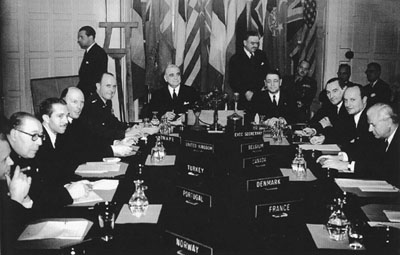Article
National Holidays
The derivation of the three Christian holidays needs no explanation. New Year's Day, January 1, marks the beginning of the new year.

Enter your search term
Signing up enhances your TCE experience with the ability to save items to your personal reading list, and access the interactive map.
Create AccountArticle
The derivation of the three Christian holidays needs no explanation. New Year's Day, January 1, marks the beginning of the new year.
"https://d3d0lqu00lnqvz.cloudfront.net/media/media/f16312ec-1fb2-4d48-83d0-bd3d93798aa2.jpg" // resources/views/front/categories/view.blade.phphttps://d3d0lqu00lnqvz.cloudfront.net/media/media/f16312ec-1fb2-4d48-83d0-bd3d93798aa2.jpg

Article
The National Party of Canada was a short-lived federal political party created by Edmonton publisher Mel Hurtig in 1992. It was a left-leaning, progressive, economic nationalist party. It opposed free trade and ran 171 candidates in the 1993 federal election but won no seats. The party fell apart due to an internal dispute and lost its registered party status in 1997. (It should not be confused with the National Party, created by disaffected NDP members in the late 1970s, or the Canadian Nationalist Party, a white supremacist hate group.)
"https://d3d0lqu00lnqvz.cloudfront.net/National_Party_of_Canada.svg.png" // resources/views/front/categories/view.blade.phphttps://d3d0lqu00lnqvz.cloudfront.net/National_Party_of_Canada.svg.png

Article
The National Policy was a central economic and political strategy of the Conservative Party under Prime Minister John A. Macdonald, and many of his successors in high office. It meant that from 1878 until the Second World War, Canada levied high tariffs on foreign imported goods, to shield Canadian manufacturers from American competition.
"https://d3d0lqu00lnqvz.cloudfront.net/media/media/3d796db1-587b-4b83-b948-3074a8fe7e80.jpg" // resources/views/front/categories/view.blade.phphttps://d3d0lqu00lnqvz.cloudfront.net/media/media/3d796db1-587b-4b83-b948-3074a8fe7e80.jpg

Article
The National Policy was a protectionist policy. It was a main focus of the Conservative Party for decades. It began under Prime Minister John A. Macdonald. It continued under many of his successors. Under the policy, Canada imposed high tariffs (taxes) on imported goods. This shielded manufacturers in Canada from US competition. The policy was in effect from 1878 until the Second World War. This article is a plain-language summary of the National Policy. If you would like to read about this topic in more depth, please see our full-length entry: National Policy.
"https://d3d0lqu00lnqvz.cloudfront.net/media/media/3d796db1-587b-4b83-b948-3074a8fe7e80.jpg" // resources/views/front/categories/view.blade.phphttps://d3d0lqu00lnqvz.cloudfront.net/media/media/3d796db1-587b-4b83-b948-3074a8fe7e80.jpg

Article
Nationalism is the doctrine or practice of promoting the collective interests of a national community or STATE above those of individuals, regions or other nations.
"https://www.thecanadianencyclopedia.ca/images/tce_placeholder.jpg?v=e9dca980c9bdb3aa11e832e7ea94f5d9" // resources/views/front/categories/view.blade.phphttps://www.thecanadianencyclopedia.ca/images/tce_placeholder.jpg?v=e9dca980c9bdb3aa11e832e7ea94f5d9

Article
The Nationalist League, founded in Montréal 1 March 1903, during renewed British IMPERIALISM, increased anglophone aggressiveness towards Francophones and growing Canadian INDUSTRIALIZATION.
"https://d3d0lqu00lnqvz.cloudfront.net/media/media/04c5cf2b-940f-4410-b1a6-fa7105c8b99e.jpg" // resources/views/front/categories/view.blade.phphttps://d3d0lqu00lnqvz.cloudfront.net/media/media/04c5cf2b-940f-4410-b1a6-fa7105c8b99e.jpg

Article
Nationalization is the takeover of ownership and control of a privately owned enterprise by the STATE.
"https://www.thecanadianencyclopedia.ca/images/tce_placeholder.jpg?v=e9dca980c9bdb3aa11e832e7ea94f5d9" // resources/views/front/categories/view.blade.phphttps://www.thecanadianencyclopedia.ca/images/tce_placeholder.jpg?v=e9dca980c9bdb3aa11e832e7ea94f5d9

Article
The Native People’s Caravan was a cross-country mobile protest that took place in 1974. Its main purpose was to raise awareness about the poor living conditions and discrimination experienced by Indigenous peoples in Canada. It travelled from Vancouver to Ottawa, where the subsequent occupation of a vacant warehouse on Victoria Island, near Parliament Hill, extended into 1975. The caravan brought various Indigenous groups together in protest of broken treaties, as well as a lack of government-supported education, housing and health care. As a result, meetings between Cabinet ministers and Indigenous leaders became more frequent. The protest is remembered as an important turning point in Indigenous activism in Canada.
"https://d3d0lqu00lnqvz.cloudfront.net/media/media/e9e4a925-a033-404d-9819-a3bb46fe9c8e.jpg" // resources/views/front/categories/view.blade.phphttps://d3d0lqu00lnqvz.cloudfront.net/media/media/e9e4a925-a033-404d-9819-a3bb46fe9c8e.jpg

Article
Social conditions, including health, income, education, employment and community, contribute to the well-being of all people. Among the Indigenous population in Canada (i.e., First Nations, Métis and Inuit peoples), social conditions have been impacted by the dispossession of cultural traditions, social inequities, prejudice and discrimination. Social conditions also vary greatly according to factors such as place of residence, income level, and family and cultural factors. While progress with respect to social conditions is being achieved, gaps between the social and economic conditions of Indigenous people and non-Indigenous people in Canada persist.
"https://d3d0lqu00lnqvz.cloudfront.net/media/media/1c9e6b76-0f75-4626-bf76-5325340c66dd.jpg" // resources/views/front/categories/view.blade.phphttps://d3d0lqu00lnqvz.cloudfront.net/media/media/1c9e6b76-0f75-4626-bf76-5325340c66dd.jpg

Article
The North Atlantic Treaty Organization (NATO) was created on 4 April 1949. It was Canada’s first peacetime military alliance. It placed the country in a defensive security arrangement with the United States, Britain, and Western Europe. (The other nine founding nations were France, Norway, Denmark, Belgium, Netherlands, Luxembourg, Portugal, and Italy.) During the Cold War, NATO forces provided a frontline deterrence against the Soviet Union and its satellite states. More recently, the organization has pursued global peace and security while asserting its members’ strategic interests in the campaign against Islamic terrorism. As of 2021, there were 30 member countries in NATO.
"https://d3d0lqu00lnqvz.cloudfront.net/media/new_article_images/NATO/Flag_of_NATO.svg" // resources/views/front/categories/view.blade.phphttps://d3d0lqu00lnqvz.cloudfront.net/media/new_article_images/NATO/Flag_of_NATO.svg

Editorial
The following article is an editorial written by The Canadian Encyclopedia staff. Editorials are not usually updated. On 4 April 1949, in the auditorium of the State Department on Washington's Constitution Avenue, the foreign ministers of Canada, the United States, the United Kingdom, France and eight other countries signed the North Atlantic Treaty.
"https://d3d0lqu00lnqvz.cloudfront.net/media/media/a8f651d1-144a-49a7-af14-dc0c180d3168.jpg" // resources/views/front/categories/view.blade.phphttps://d3d0lqu00lnqvz.cloudfront.net/media/media/a8f651d1-144a-49a7-af14-dc0c180d3168.jpg

Macleans
Long before New Brunswick Liberal cabinet minister Camille Thériault formally announced his bid for his party's - and the province's - top job on Jan. 26, his leadership ambitions were a badly kept secret.This article was originally published in Maclean's Magazine on May 11, 1998
"https://www.thecanadianencyclopedia.ca/images/tce_placeholder.jpg?v=e9dca980c9bdb3aa11e832e7ea94f5d9" // resources/views/front/categories/view.blade.phphttps://www.thecanadianencyclopedia.ca/images/tce_placeholder.jpg?v=e9dca980c9bdb3aa11e832e7ea94f5d9

Article
N―s blancs d'Amérique (1968), a Marxist analysis of Québec history and a program for the future, was written as an autobiography by Pierre Vallières while he was confined in a Manhattan jail for FLQ activities. The book argued that French Canadians workers are exploited by capitalism and colonized by anglophone elites.
"https://www.thecanadianencyclopedia.ca/images/tce_placeholder.jpg?v=e9dca980c9bdb3aa11e832e7ea94f5d9" // resources/views/front/categories/view.blade.phphttps://www.thecanadianencyclopedia.ca/images/tce_placeholder.jpg?v=e9dca980c9bdb3aa11e832e7ea94f5d9

Article
New Brunswick became one of the founding members of the Dominion of Canada on 1 July 1867 when it joined Nova Scotia, Ontario and Quebec in Confederation. Arthur Hamilton Gordon, the lieutenant-governor of New Brunswick, helped organize the Charlottetown Conference (1–9 September 1864), where a federal union of British North American colonies was first discussed. By 1865, however, a majority in the New Brunswick legislature had swung against it. Albert Smith defeated pro-Confederation premier Samuel Tilley in a snap election that year. But the Fenian Raids in 1866 fueled New Brunswick’s sense of insecurity and increased support for Confederation. After Tilley’s party won another election in 1866, the legislature voted 38–1 in favour of Confederation.
"https://d3d0lqu00lnqvz.cloudfront.net/media/media/bb8000df-c2b6-4d69-821d-db39907e5078.jpg" // resources/views/front/categories/view.blade.phphttps://d3d0lqu00lnqvz.cloudfront.net/media/media/bb8000df-c2b6-4d69-821d-db39907e5078.jpg

Article
Founded in 1961, the New Democratic Party (NDP) is a social democratic political party that has formed the government in several provinces but never nationally. Its current leader is Jagmeet Singh. In 2011, it enjoyed an historic electoral breakthrough, becoming the Official Opposition in Parliament for the first time. Four years later, despite hopes of winning a federal election, the NDP was returned to a third-place position in the House of Commons. It slipped to fourth place in the 2019 federal election, after a resurgence from the Bloc Québécois.
"https://d3d0lqu00lnqvz.cloudfront.net/media/media/589cc37c-753e-4e62-b7c5-58331589fde6.jpg" // resources/views/front/categories/view.blade.phphttps://d3d0lqu00lnqvz.cloudfront.net/media/media/589cc37c-753e-4e62-b7c5-58331589fde6.jpg
